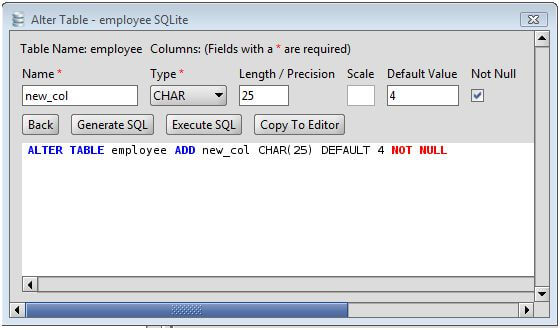
Since SQLiteConnectionHandle overrides the CriticalHandle.ReleaseHandle() function to call sqlite3_close_interop() (through another function) this does not close the database.įrom my point of view this is a very bad way to do things since the programmer is not actually certain when the database gets closed, but that is the way it has been done so I guess we have to live with it for now, or commit a few changes to. This is done through a call to SQLiteConnectionHandle.Dispose(), however this doesn't actually release the pointer until the CLR's Garbage Collector performs some garbage collection. What happens when you call SQLiteConnection.Close() is that (along with a number of checks and other things) the SQLiteConnectionHandle that points to the SQLite database instance is disposed. I just ended up throwing an exception when you attempted to delete a SQLite DB using my library.Īnyway, this afternoon I was looking through it all again and figured I would try and find out why it was doing that once and for all, so here is what I've found so far. Throw new IOException("Unable to close file" + filename) Įncountered the same problem a while ago while writing a DB abstraction layer for C# and I never actually got around to finding out what the issue was. GC.Collect() // yes, really release the dbĬatch (IOException e) // delete only throws this on locking Is there anything else I can check? Is there a way to get a list of any open commands or transactions?

I saw a two year old bug just like this but the changelog says it's fixed. It does not show my program releasing the db file after the close(). ProcMon shows my program and my antivirus looking at the database file. The sql commands between open and close are just selects. So I'm fairly sure it's not an open transaction.
Disconnect from sql db sqlite code#
I have transaction code but it doesn't run at all before the Close() call.

I've re-tried the Delete() in the debugger after a few minutes, so it's not a timing issue.

The code is just myconnection.Close() Īnd the Delete throws an exception that the file is still in use.

In the main function, the person variable calls the query_db function and prints the fields of the row with an age value equal to 25.I'm having a problem closing my database before an attempt to delete the file. You’ll have to add the diesel and dotenv crates to your project’s dependencies in the dependencies section of your cargo.toml file. With powerful tools, features, and excellent documentation, Diesel has become a go-to choice for many Rust developers looking to build robust and scalable data-driven applications. As an ORM, Diesel provides features from query building and execution to model definition and database schema migrations, making it easier for you to interact with databases and write efficient, clean, and easy-to-maintain code.ĭiesel also supports multiple database engines including PostgreSQL, MySQL, and SQLite, and provides a robust set of features for handling complex database operations like transactions, joins, and aggregate functions. The Diesel ORM is one of the most popular database packages in the Rust ecosystem.
Disconnect from sql db sqlite drivers#
For SQL databases, you get to choose between database drivers like Libpq, Mysql-connector, and Sqlite3 that provide an interface for Rust programs to interact with databases directly without any abstraction layer on the SQL and ORMs (Object-Relational Mappers) like Diesel, Sqlx, and Rust-postgres that provide a convenient way to work with database over Rust data types such as structs and functions.


 0 kommentar(er)
0 kommentar(er)
